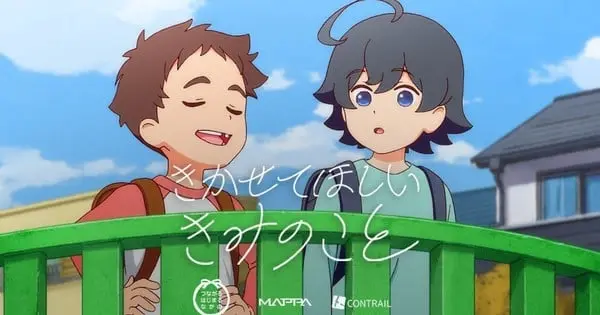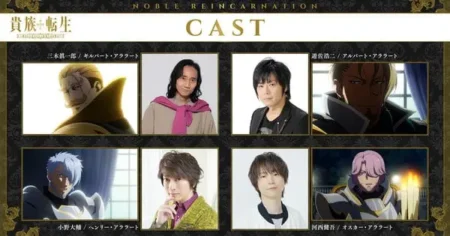Sibling animation studios MAPPA and Contrail have released a poignant anime short, “Kikasete Hoshii Kimi no Koto” (Tell Me About Yourself), streaming on the official YouTube channel of Tokyo’s Nakano Ward. This 4-minute short brings attention to a pressing social issue in Japan: the challenges faced by “young carers.”
Who are Japan’s Young Carers?
Young carers are children and young people under the age of 18 who provide significant care and support to family members. This support can include:
- Practical tasks: Housework, cooking, cleaning, shopping.
- Personal care: Helping with washing, dressing, and feeding.
- Emotional support: Providing companionship and a listening ear.
- Nursing care: Administering medication, changing dressings, and assisting with mobility.
These responsibilities, which would typically fall to adults, are taken on by children due to various circumstances, such as parental illness, disability, or other family needs. The Japan Carer Federation defines young carers as those “under the age of 18 who take on caregiving responsibilities normally under an adult’s hands.”
A Growing Issue in Japan
The issue of young carers is gaining increasing attention in Japan, with studies highlighting the significant number of children and adolescents who balance schoolwork with caregiving duties. Several factors contribute to this phenomenon:
- Aging population: Japan faces a rapidly aging population, leading to increased demand for care for the elderly.
- Declining birth rate: Smaller families mean fewer adults are available to share caregiving responsibilities.
- Single-parent households: A rise in single-parent families places greater pressure on children to assist with household and caregiving tasks.
- Increased female workforce participation: With more women in the workforce, traditional caregiving roles within the family are shifting.
- Traditional values: The lingering influence of a patriarchal family system can reinforce the idea that caring for family members is a virtuous duty.
Statistical Snapshot
Several surveys and studies have shed light on the prevalence of young carers in Japan:
- A 2021 Ministry of Health, Labor, and Welfare survey revealed that 5.7% of second-year junior high students and 4.1% of second-year high school students are young carers.
- Another study, using the BBC/University of Nottingham survey, estimated the prevalence of young carers among adolescents in the Tokyo metropolitan area to be 7.4%.
- The Nippon Foundation reports that young carers start caregiving at an average age of 9.9 years, handling care roles that even adults find difficult.
- A 2022 survey by the Children and Families Agency indicated that 6.5% of sixth-grade students, 5.7% of eighth-grade students, 4.1% of tenth-grade students, and 10.2% of third-year university students reported caring for a family member.
These statistics paint a concerning picture of the number of young people burdened with significant caregiving responsibilities in Japan.
The Impact on Young Carers
The demands of caregiving can have a profound impact on the lives of young carers, affecting their education, well-being, and future prospects.
Education
- School Absences and Lateness: Young carers are more likely to miss school or arrive late due to their caregiving responsibilities.
- Difficulty Concentrating: The stress and exhaustion associated with caregiving can make it difficult for young carers to focus on their studies.
- Falling Grades: Many young carers struggle to complete homework and assignments, leading to a decline in their academic performance.
- Reduced Educational Opportunities: The burden of caregiving can limit young carers’ ability to participate in extracurricular activities or pursue higher education.
Mental and Physical Health
- Stress and Anxiety: Balancing caregiving with school and social life can be incredibly stressful, leading to anxiety and feelings of overwhelm.
- Depression: Studies have shown that young carers are at a higher risk of developing depression, particularly those who provide long-term care.
- Social Isolation: Caregiving can limit opportunities for young carers to socialize with friends and peers, leading to feelings of loneliness and isolation.
- Burnout: The constant demands of caregiving can lead to emotional and physical exhaustion, resulting in burnout.
- Self-Harming Behavior and Suicidal Thoughts: Research indicates that long-term caregiving is associated with an increased likelihood of self-harm and suicidal thoughts, especially among young carers aged 14-16.
Social and Emotional Development
- Loss of Childhood: Young carers often miss out on typical childhood experiences, such as playing with friends or pursuing hobbies.
- Difficulty Forming Relationships: The responsibilities of caregiving can make it difficult for young carers to develop and maintain relationships with peers.
- Low Self-Esteem: Young carers may feel inadequate or resentful of their caregiving role, leading to low self-esteem.
- Identity Issues: Some young carers feel that caring for their family member is their identity due to long-term care and limited experience outside their home.
- Guilt and Worry: Young carers may feel guilty about not being able to provide adequate care or worry about the well-being of the person they are caring for.
Long-Term Consequences
The challenges faced by young carers can have lasting consequences that extend into adulthood. They may experience:
- Difficulty securing employment: Limited education and work experience can make it difficult for young carers to find stable employment.
- Ongoing mental health issues: The stress and trauma of caregiving can contribute to long-term mental health problems.
- Relationship difficulties: Past experiences can affect their ability to form healthy relationships.
- Financial instability: The cumulative effects of these challenges can lead to financial instability and poverty.
The Role of “Contrail” and MAPPA
By creating “Kikasete Hoshii Kimi no Koto,” MAPPA and Contrail are using their platform to raise awareness about the realities faced by young carers in Japan. Animation has the power to connect with audiences on an emotional level, making complex social issues more relatable and understandable.
MAPPA, known for producing popular anime such as “Jujutsu Kaisen,” “Attack on Titan,” and “Chainsaw Man,” has a significant influence on contemporary media. Contrail, established in 2019 as a group company of MAPPA, focuses on creating new animated works. Their collaboration on this project demonstrates a commitment to addressing social issues through their art.
Social Impact and Awareness
The anime short can serve as a valuable tool for:
- Promoting Understanding: Helping the public understand the challenges and sacrifices made by young carers.
- Encouraging Empathy: Fostering empathy and compassion for young carers and their families.
- Reducing Stigma: Breaking down stigmas associated with caregiving and mental health.
- Inspiring Action: Motivating individuals and organizations to support young carers and their families.
By showcasing the experiences of young carers, “Kikasete Hoshii Kimi no Koto” can spark conversations, raise awareness, and ultimately contribute to creating a more supportive and inclusive society for these vulnerable young people.
Support and Solutions
Addressing the challenges faced by young carers requires a multifaceted approach involving government, schools, communities, and families.
Government Initiatives
- Increased Funding: Allocating more resources to support programs and services for young carers.
- Policy Development: Developing comprehensive policies that recognize and protect the rights of young carers.
- Awareness Campaigns: Implementing public awareness campaigns to educate the public about young carers and their needs.
- Financial Assistance: Providing financial assistance to families to help alleviate the burden of caregiving.
- Long-Term Care Insurance Reform: Encouraging local governments to introduce measures aimed at reducing the burden of young carers.
- Surveys and Training Programs: Supporting local governments in conducting surveys and training programs for young carers.
- Collaboration: Fostering collaboration between social welfare, long-term care, health care, and educational institutions.
School-Based Support
- Identification: Training teachers and school staff to identify young carers.
- Counseling: Providing access to counseling and support services for young carers.
- Flexible Attendance: Offering flexible attendance policies to accommodate caregiving responsibilities.
- Academic Support: Providing tutoring and other academic support to help young carers succeed in school.
- Awareness Programs: Implementing awareness programs to educate students about young carers and promote understanding.
Community Support
- Respite Care: Providing respite care services to give young carers a break from their responsibilities.
- Support Groups: Creating support groups where young carers can connect with others who understand their experiences.
- Mentoring Programs: Pairing young carers with adult mentors who can provide guidance and support.
- Information and Resources: Providing access to information and resources about caregiving, mental health, and available support services.
Family Support
- Open Communication: Encouraging open communication within families about caregiving responsibilities and needs.
- Professional Help: Seeking professional help from therapists or counselors to address family dynamics and stress.
- Shared Responsibility: Encouraging other family members to share caregiving responsibilities.
- Self-Care: Prioritizing self-care for all family members to prevent burnout and maintain well-being.
Raising Awareness
- Education: Increasing awareness among school staff and other relevant parties about the experiences and emotions of young carers.
- Publicity: Promoting the understanding of the term ‘young carers’ among the general public.
A Call to Action
“Kikasete Hoshii Kimi no Koto” serves as a reminder that young carers are not invisible. They are children and young people who deserve our recognition, support, and protection. By raising awareness, promoting understanding, and implementing effective support systems, we can help ensure that these young people have the opportunity to thrive and reach their full potential. It is essential for adults to understand and acknowledge the caregiving responsibilities that these children face and connect them with the necessary resources.
MAPPA and Contrail’s initiative is a step in the right direction. It is now up to all of us to take action and create a brighter future for Japan’s young carers.









